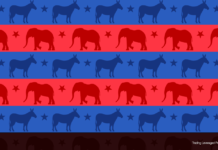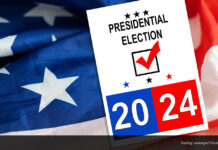The president of the United States of America has a huge influence on how the world responds to international crises, such as wars, global pandemics and climate change. That’s why the US presidential elections have always been an important landmark political event worldwide.
Similar to many countries, the US follows a Presidential republic government system. However the US is a federal republic and a representative democracy with three separate branches of government, including a bicameral legislature. In contrast with the rest of the world they have a very unique election system due to its indirect character, as Americans vote for electors of their preferable candidate. This means that when someone votes for their preferred candidate, they’re voting in a state-level contest rather than a national one. Hence electors from all states are the ones that are going to actually elect a president. The winner will be the party that gets 270 or even more electors, out of 538. In the event no candidate receives a majority, the House of Representatives chooses the president and the Senate chooses the vice president. In most cases, a projected winner is announced on election night in November after voting closes. But the actual Electoral College vote takes place in mid-December when the electors meet in their states.
US elections are held every four years, in years divisible by four, in which electors for President and Vice President are chosen according to the method determined by each state. It is statutorily set as “the Tuesday next after the first Monday in the month of November” equalling “the first Tuesday after November 1”. The earliest possible date is November 2, and the latest possible date is November 8. This year, US Election day is November 3rd.
Usa.gov
This year’s candidates are the former Vice-President Joe Biden for the Democrats and President Donald Trump, the Republican nominee. Other than Trump & Biden, voters will also be choosing new members of when they fill in their ballots on November 3rd.
The presidential election process follows a typically this cycle as described founded on the US government page:
- Spring of the year before an election – Candidates announce their intentions to run.
- Summer of the year before an election through spring of the election year – Primary and caucus debates take place.
- January to June of election year – States and parties hold primaries and caucuses.
- July to early September – Parties hold nominating conventions to choose their candidates.
- September and October – Candidates participate in presidential debates.
- Early November – Election Day
- December – Electors cast their votes in the Electoral College.
- Early January of the next calendar year – Congress counts the electoral votes.
- January 20 – Inauguration Day
This article however was not solely composed in order to help you understand the US governmental system, but mainly to be the reference point ahead of a very uncertain environment in politics but also in markets. The potential election outcome will have an immediate impact on the global economy and global markets as well, since each candidate represents different economic and fiscal policies but also different trade policies especially now there is rising tension between the US and China. Hence in our upcoming articles we will focus on the expected impact from potential election outcomes on the markets in general, and more precisely the Stock markets.
Last but not least, here are the upcoming key dates ahead of the November 3rd Election day:
29 September – The University of Notre Dame was scheduled to host the first 2020 presidential debate, but the university withdrew from the event over health concerns. The debate is now scheduled to be held at the Case Western Reserve University in Ohio.
7 October – Republican and Democrat nominees for vice president will debate at the University of Utah, which hosts the only debate between the running mates.
15 October – The second presidential debate will take place at the Adrienne Arsht Centre for the Performing Arts in Miami.
22 October – Belmont University in Nashville, Tennessee will host the third and final presidential debate.
Click here to access the Economic Calendar
Andria Pichidi
Market Analyst
Disclaimer: This material is provided as a general marketing communication for information purposes only and does not constitute an independent investment research. Nothing in this communication contains, or should be considered as containing, an investment advice or an investment recommendation or a solicitation for the purpose of buying or selling of any financial instrument. All information provided is gathered from reputable sources and any information containing an indication of past performance is not a guarantee or reliable indicator of future performance. Users acknowledge that any investment in Leveraged Products is characterized by a certain degree of uncertainty and that any investment of this nature involves a high level of risk for which the users are solely responsible and liable. We assume no liability for any loss arising from any investment made based on the information provided in this communication. This communication must not be reproduced or further distributed without our prior written permission.


















